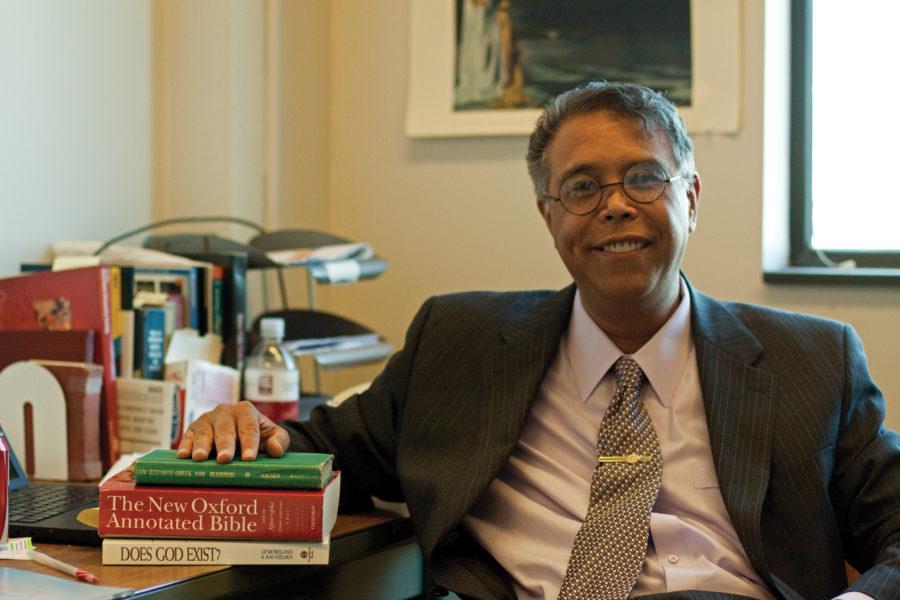In lecture commemorating 9/11, Avalos presents theory of religious violence
Bryan Langfeldt/Iowa State Daily
Hector Avalos, professor of philosophy and religious studies, explains his reasoning and logic regarding being an atheist. His curiosity in Christianity’s background led Avalos to become atheist.
September 6, 2011
Religious Studies Professor Hector Avalos outlined a theory Tuesday in the Memorial Union that he claimed could explain and predict the incidence of religious violence. In a lecture given to commemorate the coming 10-year anniversary of the 9/11 attacks, Avalos drew on the arguments of his 2005 book “Fighting Words: The Origins of Religious Violence.”
He defended the book’s central thesis — that religion causes violence by creating scarce resources whose existence is unverifiable — with historical examples and detailed citations of Christian, Judaic and Islamic sacred texts.
Before presenting evidence for his thesis, Avalos put it in context by giving his audience a primer in scarce-resource theory, which contends that conflict results from opposed groups’ efforts to either maintain access to or gain hold of valuable commodities of limited supply. He listed water, oil and information as examples of scarce resources.
But Avalos also said that a resource didn’t have to have any kind of observable physical existence for groups to see it as worth fighting for.
Avalos professed that these sorts of resources, the existence of which he called “unverifiable,” were the kind that drove the faithful against each other.
Avalos said religious people created scarce resources through four mechanisms:
- Inscripturation: Creating a sacred text (such as the Bible or the Koran) that evinces a certain group’s knowledge of divine will.
- Creation of sacred space: Declaring a certain area (such as the Holy Land or Mecca) more valuable than surrounding areas.
- Group privileging: Granting spiritual or divine privileges to one group (such as Jews, Christians or Muslims) and denying them to others on the basis of a religious rationale.
- Salvation: Bestowing what Avalos called “long-term permanent benefits” (such as eternal life or forgiveness of sin) to followers of a certain faith.
Avalos said danger arises when groups make conflicting claims about having these resources. He added that because such claims can’t be proven or disproven, groups sometimes see no other way to settle them than by force.
Avalos told his listeners he found struggles for resources like these morally unacceptable.
“It is immoral to destroy life, or to commit any act of violence for anything that does not exist or cannot be proven to exist,” he said.
Drawing his lecture to a close, Avalos presented two scenarios for the future, calling one “pessimistic” and the other “optimistic.”
In his pessimistic scenario, Avalos imagined a future in which nuclear powers waged global, religiously motivated war against each other. In this war, he conjectured, combatants would target sacred sites like Mecca and the Vatican. Their fighting would span generations.
In his optimistic scenario, Avalos imagined a world in which the influence of religious groups was mitigated by education and emphasis on reason-based problem solving. Under these conditions, adherents of Abrahamic religions wouldn’t have to abandon their faiths, but they would have to acknowledge the traditions of violence within them. They also would have to reject any passages in their sacred texts that advocated violence — a process Avalos called “decanonization.”
Avalos expressed his hope that his optimistic vision would be realized.
“If you’re willing to think anew, then maybe … there is a glimmer of hope that 9/11 would never happen again.”
Reaction to Avalos lecture was mixed. Dr. Nicolas Hamouche, a Christian, said he thought Avalos had generalized too broadly about too many faiths, and said he had “raised too many issues” for a single lecture.
“I don’t see causes or teachings that encourage violence,” Hamouche said of his faith.
Jared Wilson, an Ames resident, former Bible college student and current atheist, received Avalos’ views much more favorably.
“A lot of it was really true to my experience with the church,” Wilson said.

















